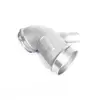Mobile:+86-311-808-126-83
Email:info@ydcastings.com
German
impeller motor
Understanding Impeller Motors Applications and Advantages
Impeller motors are an integral component in a variety of industrial applications, ranging from water treatment facilities to chemical processing plants. These specialized motors utilize the principle of rotational motion to drive impellers, which are crucial for fluid movement. Their design and functionality make them highly efficient for tasks that require the pumping or circulation of liquids or gases.
The operation of an impeller motor is fundamentally based on the conversion of electrical energy into mechanical energy. When electric current is supplied to the motor, it creates a magnetic field that induces rotation in the motor's shaft. This shaft is connected to one or more impellers, which are blades or discs designed to push fluids. As the impellers rotate, they impart kinetic energy to the fluid, resulting in a flow that can be directed through various pathways.
One of the key advantages of impeller motors is their high efficiency. Compared to traditional motors, impeller motors minimize energy loss, making them ideal for applications that require continuous operation. Their ability to maintain a consistent flow rate while consuming less power makes them particularly desirable in industries where energy efficiency is a priority.
impeller motor

Furthermore, impeller motors are versatile and can be engineered to handle various types of fluids, including viscous liquids, slurries, and even gases
. This adaptability allows them to be utilized in a wide range of sectors, including HVAC systems for air circulation, automotive applications for cooling systems, and water treatment processes where mixing and flow control are essential.Moreover, impeller motors can be designed with different configurations and materials to withstand specific environmental conditions. For instance, in corrosive environments, impellers made of stainless steel or specialized plastics can ensure longevity and reliability. Additionally, the ability to customize the size and shape of the impeller allows for optimizing the motor's performance based on the specific requirements of the application.
Another significant benefit of impeller motors is their relatively low maintenance requirements. With fewer moving parts compared to other motor types, impeller motors are less prone to wear and tear, resulting in reduced downtime and maintenance costs. This reliability is crucial for industries where uninterrupted operation is critical.
In conclusion, impeller motors play a vital role in modern industrial applications by providing efficient fluid movement solutions. Their advantages, including high efficiency, versatility, customization, and low maintenance, make them a preferred choice in various sectors. As technology continues to evolve, the development of more advanced impeller motor designs will likely enhance their performance and broaden their range of applications even further. Whether in manufacturing, water treatment, or HVAC systems, understanding and harnessing the capabilities of impeller motors will be essential for optimizing operational efficiency and sustainability.











